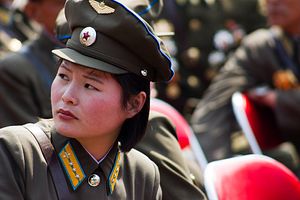Earlier this week, the United Nations Security Council unanimously adopted some of harshest sanctions ever against North Korea in response for Pyongyang’s January nuclear test and February long-range missile launch. As Richard Nephew noted over at 38 North, the new sanctions, courtesy of UN Security Council resolution 2270, are “probably the most comprehensive, legally-binding sanctions program imposed against a country since Iraq in the 1990s.”
Pyongyang’s never been happy to see sanctions after its nuclear and missile tests and this time is no exception. Shortly after the Security Council adopted resolution 2270, North Korea fired six short-range missiles into the Sea of Japan. The launches represented the most immediate lashing out by Pyongyang, which was eager to make clear its dissatisfaction with the new sanctions. New sanctions shouldn’t have been surprising for North Korean leaders, but perhaps Pyongyang was taken off-guard by China’s willingness to sign on to a harsher regime than ever before. For example. under resolution 2270, U.N. member states are required to inspect all cargo bound for North Korea for prohibited items and, perhaps most vexing for Kim Jong-un’s bon vivant tendencies, a far-reaching ban on luxury goods exports to North Korea.
Early on Friday morning, Kim Jong-un followed up the initial round of lashing out with a statement condemning the “U.S. imperialists and their followers’ flagrant moves for political and economic pressure and military aggression on” North Korea. The statement, carried in state media, drew headlines internationally for a statement toward its conclusion that referred to nuclear weapons. Specifically, Kim stressed “the need to get the nuclear warheads deployed for national defense always on standby so as to be fired any moment.” The statement was otherwise par for the course in its florid prose, typical of the North Korean government following adverse action against it by the international community.
The call for readying nuclear warheads is a bit premature, given what we know about North Korea’s nuclear weapons and long-range rocket programs. For example, North Korea almost certainly doesn’t actually have nuclear warheads that are ready to be mated with long-range missiles and placed on high alert. Its nuclear test devices are probably, at best, still the size of an ice cream truck and Pyongyang hasn’t shown that it has successfully engineered an accurate and reliable warhead capable of atmospheric reentry. (U.S. and South Korean officials have gone back and forth on the miniaturization issue lately; Jeffrey Lewis has a good evaluation of the miniaturization issue at 38 North.) Its four launches of earth observation satellites, two of which failed, involved ballistic missile technology carrying a payload into sun-synchronous orbit, but nothing in the way of earth reentry. (Stuff went up, but nothing came down.) Thus, despite Kim’s calls to action, no warheads will be put at the ready anytime soon.
The takeaway from the launch of short-range missiles and Kim’s statement on Friday is that Pyongyang is particularly upset about the latest round of sanctions. It may be possible that Kim miscalculated the extent to which China would work with the United States on harsher sanctions. What’s also worth considering is that if Kim is planning on unveiling a major program of economic reform at the upcoming Workers’ Party Congress later this year, then these sanctions will be a major setback. That’s perhaps an additional reason for the sound and fury following resolution 2270.
This article has been updated.

































